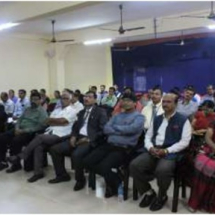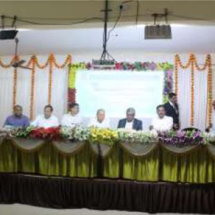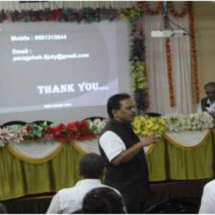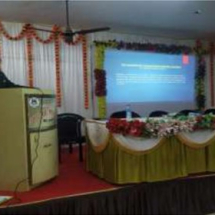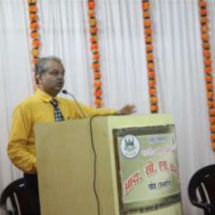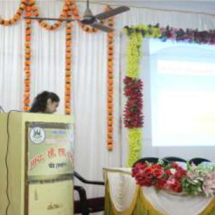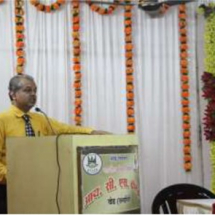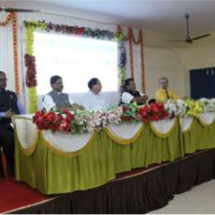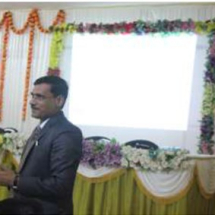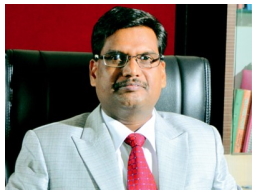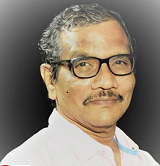Two Days National Seminar on “Revised Accreditation Framework”?
Event Gallery
Event Report
NAAC Sponsored
2nd & 3rd August 2019.
Organized by
Internal Quality Assurance Cell (IQAC)
Shrimati Indira Mahadev Beharay College Of Arts Shriman Chandulal Sheth College Of Commerce & Shrimati Shobhanatai Chandulal Sheth College Of
Science, Khed, Dist. Ratnagiri
Assisted by
IQAC Cluster India
REPORT
Two Days National seminar on “Revised Accreditation framework” sponsored by NAAC, Bangalore
was organized at SHRIMATI INDIRA MAHADEV BEHARAY COLLEGE OF ARTS SHRIMAN CHANDULAL SHETH COLLEGE OF COMMERCE & SHRIMATI SHOBHANATAI CHANDULAL SHETH COLLEGE OF SCIENCE, KHED during 2nd -3rd August, 2019. A total of 66 delegates were present for seminar. There were a total of 22 papers presented during the two days. Following sub-themes were dealt with during the seminar.
The inaugural session was held on the 2nd of August, 2019. The programme started with the invocation. Welcomed the dignitaries on the dice and the galaxy of the scholars from different parts of the country. The seminar was inaugurated by Dr. Ganeshchandra N. Shinde, Ex-pro vice chancellor, SRTM University, Nanded. He wished the seminar a great success and was of the opinion that new education policy is need of time. This was followed by speech of Dr. Vyankat Pawar, Principal, Sunderrao Solanke Mahavidyalaya, Majalgaon Dist. Beed, who highlighted briefly key point to achieve better grade in RAF. This is followed by Mr. Mangeshbhai Butala, focus on the vision Sahajeevan Shikshan Sanstha. He comprehensively talked on 3 core components namely to make educate, earner and empower to rural India. Then after Dr. G.B. Sarang, Convener of the seminar highlighted about theme of the Seminar, followed by Dr. A.M. Shaikh, Co-ordinator of the Seminar, focus on the seven themes of the seminar along with the total number of participants, different plenary session and technical sessions. He also brief about the modus operandi of the two days seminar. After this there was a comprehensive talk by Honrable Hirachand Butala, President of Sahajeevan Shikshan Sanstha. The session ended with the vote of thanks delivered by Dr. A. M. Shaikh.
There was a tea break for 15 minutes and followed by the key note addresses by Dr. Ganeshchandra N. Shinde .Ex-pro vice chancellor, SRTM University, Nanded.
Plenary secessions where conducted by eminent speaker of IQAC CLUSTER INDIA like Prof. Bharat Khangude, Prof. Parag Shaha, Dr. Hemant Chandak, Dr. Ayub Shaikh and many more. Litterly it was feast of information on Revised Accreditation Process for Colleges of Western Region of Maharashtra.
KEYNOTE ADDRESS
Dr. Ganeshchandra N. Shinde, Ex-pro vice chancellor, SRTM University, Nanded.
Topic- New education policy and NAAC:
Draft National Education Policy: NEP 2019: The last National Education Policy (NEP) was released in 1986 and modified in 1992. Since then major changes have been observed in the world and in our country and the education policy needed to be modified as per the current scenario.
In order to make changes and implement new policy from primary, secondary & higher education, a committee was set up (June 2017) to prepare a draft of a new National Education Policy, under the chairmanship of Dr. Krishnaswamy Kasturirangan.
The committee handed over the draft of its new National Education Policy 2019 to the central government. In order to learn public opinion, MHRD has released the draft to the public. Links to download PDF of Draft National Education Policy – NEP 2019 is given at the end of this article.
However, the Central Government has not considered the recommendation of the committee in which it has been suggested to make Hindi compulsory. After going through this article, you will learn about the recommendations that the committee has suggested changes in education. Here you will also learn about the changes suggested by the committee regarding primary, secondary and higher education.
Some important features, recommendations & suggestions from Draft National Education Policy 2019:
- The Draft National Education Policy, 2019 is built on the foundational pillars of Access, Equity, Quality, Affordability and Accountability.
- Renaming of MHRD as Ministry of Education (MoE)
- Free and compulsory education from pre-school to 12th
- A major reconfiguration of curricular and pedagogical structure with Early Childhood Care and Education (ECCE) as an integral part of school education is proposed.
- Extension of Right to Education Act 2009 to cover children of ages 3 to 18. – A 5+3+3+4 curricular and pedagogical structure based on cognitive and socio-emotional developmental
Stages of children:
- Foundational Stage (age 3-8 yrs): 3 years of pre-primary plus Grades 1-2;
- Preparatory Stage (8-11 years): Grades 3-5;
- Middle Stage (11-14 years): Grades 6-8; and
- Secondary Stage (14-18 years): Grades 9-12.
- Schools will be re-organized into school complexes. It also seeks to reduce the content load in the school education curriculum.
- There will be no hard separation of learning areas in terms of curricular, co-curricular or extracurricular areas and all subjects, including arts, music, crafts, sports, yoga, community service, etc. will be curricular. It promotes active pedagogy that will focus on the development of core capacities: and life skills, including 21st-century skills.
- The Committee proposes for massive transformation in Teacher Education by shutting down sub-standard teacher education institutions and moving all teacher preparation/education programmes into large multidisciplinary universities/colleges.
- The 4- year integrated stage-specific B.Ed. programme will eventually be the minimum degree qualification for teachers.
- In higher education, a restructuring of higher education institutions with three types of higher education institutions is proposed-
Type 1: Focused on world-class research and high-quality teaching;
Type 2: Focused on high-quality teaching across disciplines with significant contribution to research;
Type 3: High-quality teaching focused on undergraduate education.
- This will be driven by two Missions -Mission Nalanda & Mission Takshashila.
- There will be re-structuring of Undergraduate programs (e.g. BSc, BA, BCom, BVoc) of 3 or 4 years duration and having multiple exits and entry options.
- A new apex body Rashtriya Shiksha Ayog is proposed to enable a holistic and integrated implementation of all educational initiatives and programmatic interventions and to coordinate efforts between the Centre and States.
- The National Research Foundation, an apex body is proposed for creating a strong research culture and building research capacity across higher education.
- The four functions of Standard setting, Funding, Accreditation and Regulation to be separated and conducted by independent bodies: National Higher Education Regulatory Authority as the only regulator for all higher education including professional education.
- Creation of accreditation eco-system led by revamped NAAC; Professional Standard Setting Bodies for each area of professional education and UGC to transform to Higher Education Grants Commission (HEGC).
- The private and public institutions will be treated on par and education will remain a ‘not for profit’ activity.
- Several new policy initiatives for promoting the internationalization of higher education, strengthening quality open and distance learning, technology integration at all levels of education, adult and lifelong learning and initiatives to enhance participation of underrepresented groups, and eliminate gender, social category and regional gaps in education outcomes are recommended.
- Promotion of Indian and Classical Languages and setting up three new National Institutes for Pali, Persian and Prakrit and an Indian Institute of Translation and Interpretation (IITI) has been recommended.
- The path-breaking reforms recommended will bring about a paradigm shift by equipping our students, teachers and educational institutions with the right competencies and capabilities and also create an enabling and reinvigorated educational eco-system for a vibrant new India.

